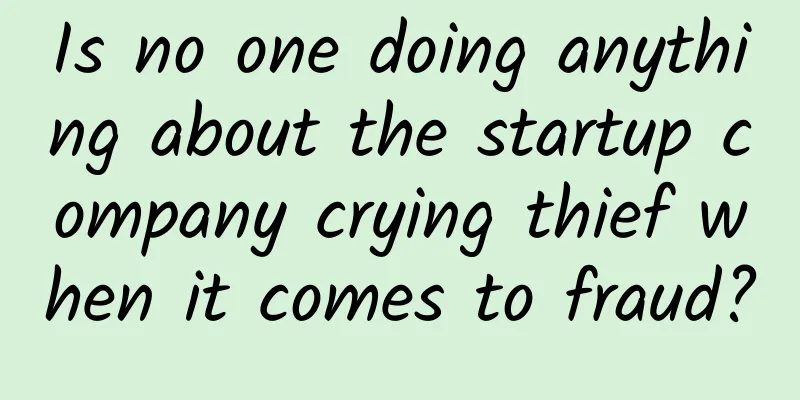Is no one doing anything about the startup company crying thief when it comes to fraud?

|
The venture capital circle seems to be experiencing a major Mercury retrograde. In June 2016, Mayu announced that it had achieved profitability in the second quarter, with a user base of over 10 million. Some people exclaimed: Is the spring of free tool apps coming? The subsequent exposure of Mayu’s data fraud gave a “so that’s it” response. In the past month, various media have intensively reported that several companies have falsified data. Renrenche, Guazi Used Car, Mayu, Dayima, Qingting FM, Ximalaya, the names of the companies involved are listed one by one. You can easily notice the "pairs" among them, and the "unswerving" relationship between competitors seems to be vividly demonstrated. Following the financing news, it is never just flowers and applause, but also the "enemy" artillery fire. In this capital winter, the battles are more fierce and frequent, because one careless move may mean complete destruction. It is hard to tell whether the startups are genuine or not, and the winners and losers are still unknown. As for the investors, they are not as surprised as the ordinary onlookers. Someone in the industry said, "If it is not a company that they invest in, they will probably just watch the excitement, after all, it is commonplace... If it is an industry or company that they intend to invest in, the bubbles may be squeezed out by the competition, and they can also get a glimpse of the founder's personality and style of doing things, which is not a bad thing." However, the scene was not a good one after all. In the words of Mr. Luo, it was "too disgraceful." If you look back at the history of the companies mentioned above, you will find that most of them have excellent teams, entrepreneurial experience, and financing stories that have impressed many investors. Founded in the entrepreneurial boom (2012-2014), they had smooth sailing in the early rounds of financing. With huge amounts of financing in hand, they would burn money on subsidies and advertising to increase traffic in order to gain a larger market share. The subsequent plot should be to exhaust all competitors and successfully become the industry leader. Then they can achieve positive cash flow by charging for existing businesses or providing value-added services. Then they can diversify and expand their scale. But unfortunately, they have yet to become a monopoly leader, and what’s worse is that the way Internet entrepreneurship is played has begun to change. The rules of the game have changed. 2VC is no longer viable. In the second half of 2015, the entrepreneurial fever gradually subsided, and investment institutions became more calm. The phrase "traffic monetization" alone could no longer easily convince investors who had tightened their wallets. Not long ago, Didi investor Zhu Xiaohu also said that nowadays, compared with revenue, growth rate, and turnover, investors are more concerned about your gross profit and customer acquisition costs. In other words, investors want to see the current profitability of the company. For those startups that have been struggling in the industry for several years but are still making big promises, investors who have learned their lessons are becoming more cautious. As the investment tide recedes, more and more naked swimmers are revealed. What is even more embarrassing for enterprises is that when they enter the later stage of development and raise funds in the C round, the data has become more and more exaggerated, and it is difficult to get off the horse, so they can only grit their teeth and move towards the horror direction. But in the final analysis, those with poor liquidity encountered the bad time of capital downturn, and they also had some self-beautifying fluke mentality. This brings us back to the old issue of "business model". As for these companies. Regardless of whether the profit data of Mayu is true or false, based on the business model of tool products, after expanding to a large scale and connecting to e-commerce, can Mayu achieve considerable profits in the future? Huxiu interviewed a senior person in the industry, who said: E-commerce makes money mainly through self-operation and financial products. The fourth-party business that provides third-party access to traffic has low profit margins and is difficult to expand. Analysys analyst Jiang Xinwei also believes that "vertical e-commerce will face the same problems that most e-commerce companies are currently facing. In the process of continuous development, the distinction between large platforms and vertical businesses will become increasingly blurred. When vertical platforms strive to do larger businesses for greater traffic and performance, the cost of overall business development will increase accordingly." On the other hand, while Dayima is increasing its revenue through e-commerce, it is also trying to expand into the medical field and make its own hardware products. In August 2016, Chai Ke once told the media: "Internet companies are only one of Dayima's dominant characteristics. Medical and health are the areas that Dayima has been focusing on developing over the past four years." According to public data, over the past four years, Dayima has raised a total of 400-500 million yuan from investors, but its menstrual management tools have not made any profit, and it has not "focused on developing" a single medical and health product. It is no wonder that some media have questioned: "It is difficult to position its brand after seven rounds of financing and still needs to transform." In order to seek high profits, vertical tool apps extend in depth and find core competitiveness. This development idea is correct. But what kind of product should be made? What is the user conversion rate? Can it reach above the break-even point? Smart hardware requires large investment and fast updates. After crossing over, it will also face fierce competition in another field. This will also be a "nine deaths and one life" road. Chai Ke is too good at telling stories, and investors in the past have given him enough patience. Now, compared with his ability to draw big cakes, he urgently needs to prove his ability to make money. Relatively speaking, the business models of Renrenche and Guazi seem to be more mature, acting as free transaction intermediaries and then making profits through finance and the automotive aftermarket. However, they have not become the next Didi. The online car purchase, consumer habits, and the role of the platform are not yet mature. Tiger Sniff author Zhang Jun once wrote in an article: "No matter how big the market is, if there is no awesome solution, it has basically nothing to do with you. What is an awesome solution? It is not as simple as solving the demand and closing the experience loop. It is also like what "From 0 to 1" said, it must be much more efficient than the existing mainstream players, and often the industry efficiency must be increased by more than 10 times, so that users can really be touched." Financing enters the later stage, the boss and the second boss fight each other From a competitive perspective, there is no room for two tigers in one mountain, and in the severe winter, the situation is even more ferocious. Especially when development enters the later stage and financing reaches the C round, the industry concentration increases, and the big two compete with each other. Sometimes they pursue relative values rather than absolute values. Under the confrontation, both of them take off. When Huxiu interviewed investors about companies exposing each other's data, some investors also expressed that they hoped to crush the other party with financial advantages. The best way to do this is to prevent the opponent from obtaining financing. Data is the core, and by the way, it can also reduce the other party's social brand reputation. What do investors think of such a mess? When startups falsify data, investors are undoubtedly the most direct victims. However, as long as the fire has not yet spread, they are just watching. However, there are almost no people who have no problems with the general data. They can blame each other precisely because they are well aware of this. After all, thanks to the golden eight years of mobile Internet development, the related underground falsification industry chain has become very mature. In order to avoid pitfalls as much as possible, in addition to being familiar with the industry and team, some investors said: In fact, when doing due diligence, they will judge with a sense of "distrust" and have relative expectations. Mature investors will retrieve third-party data for comparison. Another investor said that if you look at the data from the application market, you will directly discount it by 40%. However, no matter how careful one is, there are always people who are unlucky enough to fall into the trap. However, unlike the general practice of calling the police when being cheated, investors who have invested in unreliable companies often take the initiative to help find ways to fabricate data, and during a new round of financing, they work with the invested companies to deceive latecomers to take over, as if they are suffering from Stockholm syndrome. "It's quite tragic," lamented an investor. So, why not call the police if you’ve been cheated? Cases of data falsification by startups have been exposed frequently, whether it is providing false data to users, media or even investors, or even paying off third-party consulting companies to falsify data. Is it really not a big deal? For this reason, Huxiu consulted with the legal expert Huxiu author Lin Hua. He said that the companies that generally provide data are investigation and consulting companies, and the financing company gave investors deliberately fabricated false data, which constitutes fraud. 1. If investors make investments based on data, it is the same as buying rice by weight. False labeling is deceptive and misleading in investment decisions. 2. From the perspective of consequence analysis, since investors and financing companies have a contractual relationship, they can claim that the investment is invalid due to fraud and recover the investment. This also depends on the importance of the data itself. Some insignificant data or data that are indeed very different in different statistical calibers may not necessarily affect the decision. However, we seem to rarely hear of startups being punished for falsifying data. In this regard, Lin Hua said that fraud is a common practice on the Chinese Internet. For example, there will be many fake fans in live broadcasts. On the one hand, this can be seen as a vicious circle that has been formed. On the other hand, the harmfulness of fraud should also be distinguished. For example, fake fans can help live broadcast users and live broadcasters feel comfortable to a certain extent, and the degree of harm is not great. However, when it comes to startup companies being sued for data fraud, there may be two reasons. First, everyone knows the risk of giving investors written false materials during financing. Generally, financing companies will also be cautious, so it is understandable that the data given to investors is inconsistent with the publicly disclosed data. On the other hand, investors will face difficulties when their investments are not safely withdrawn. Once the relationship is torn, the investment will not be recovered and the game of passing the parcel will also be broken. This view is also shared by many investors. On the one hand, the investment manager in charge of the project will not be willing to admit that he got into trouble due to his lack of professionalism. On the other hand, even if the investor files a lawsuit, the investor's losses cannot be recovered as expected, and even the chance of a safe exit is lost, which does not sound very cost-effective. Therefore, in most cases, they choose to remain silent, actively or passively following the path of a Ponzi scheme, which seems to have become some kind of secret consensus. The frequent exposure of data fraud cases has led some investors to see this as a "signal of a mobile Internet startup bubble." Obviously, everything is just the beginning. Between 2012 and 2014, too many people left to start businesses, and the sentiment was high, and capital was also crazy. According to statistics from Dow Jones Venture Resources, the total amount of venture capital in China in 2014 reached US$15.5 billion, setting a record since the agency began to collect this data in 2006, and twice the record of US$7.3 billion set in 2011. However, good times don’t last forever. In the second half of 2015, capital suddenly turned cold. Projects that once made some waves, such as Youche, Aipinche, Baowei, and Chengtu, closed down one after another. The death list of startups was everywhere. The curse of bankruptcy was transmitted upward from the companies with the weakest risk resistance. Recently, there were a lot of “bad news” such as Bailumei’s closure, Quancheng Relian’s closure, Aixianfeng’s layoffs, Meituan’s layoffs, and Nuomi’s sale. It is worth noting that, at present, for small-scale companies with immature business models, even the top three should have noticed the crisis of survival. However, compared to wasting energy on competing with peers and industry integration, it seems to be a wiser approach to find a profit model as soon as possible or transform into other fields. As the bubble is squeezed, truly valuable industries and companies will emerge. Entrepreneurs and investors will also become more mature and rational. Finally, here are three sets of mutual disclosure cases~ Renrenche vs Guazi Used Cars In September last year, JD.com CEO Liu Qiangdong mentioned in an internal speech that a used car APP company with a valuation of US$200 million actually had a pitifully small transaction volume, "only two cars! And they were bought by the employees themselves." Be it a joke or the truth, since the second-hand car entrepreneurship became popular two years ago, commercial hype, false orders, inflated data, and exaggerated financing amounts have not been uncommon on second-hand car platforms. On August 23, Renrenche CEO Li Jian announced the latest business figures at a press conference on cooperation with TuanChe.com: Renrenche has now opened 95 cities across the country, and the second-hand car sales in July exceeded 18,000, with the scale of individual transactions leading the industry. But once the figures were announced, they aroused doubts. Some self-media broke the news that Renrenche's transaction volume in July fell sharply, even lower than the transaction volume in June, and the actual data was only a little more than 10,000. Another Beijing Business Daily reported on August 25 that Renrenche announced that it has covered 95 cities, but there are only 64 cities on its website page. According to Renrenche's "Thousand City Expansion" plan, at the current expansion rate, Renrenche has only completed 31.7%. Going back further, in August last year, Renrenche announced that it had completed a US$85 million Series C financing led by Tencent, but the press release sent to the media by Renrenche's financial advisor Huaxing Capital disclosed that the financing amount was US$62 million. The digital conflict has once again caused controversy for Renrenche. Guazi.com, another startup in the C2C used car sector, is also caught in the whirlpool of public opinion. Also at the end of August, there were rumors of senior management shake-up at Guazi. First, COO Chen Guohuan, who came from Alibaba's iron army, was transferred to CSO due to health reasons. Then, Qiu Lin, the HR director also from Alibaba, was reported to have resigned. There were also self-media reports that the former technical director Wang Xiaoyu had been sidelined. Going back to December last year, Guazi.com announced its separation from 58.com and released a series of data: the number of monthly active users has exceeded 40 million, and the number of cars currently on sale has reached 50,000. The data also attracted controversy after it was released. Some media claimed that the actual number of cars on Guazi.com was only 30,000. The verification method was to search for all online cars nationwide on Guazi.com as a consumer, and the actual number of available cars on the website was about 31,000. Meiyou vs. Auntie? Mayu and Dayima are old enemies. Both are female assistant apps. They have been together in obtaining ABCD rounds of financing until the E round. Their battle has become increasingly fierce. This time, it should be Mayu who provoked the incident. On July 18, 2016, an "internal email" from Mayu CEO Chen Fangyi was released, in which he wrote: "In the initial menstrual management market, Mayu experienced a 'bloody war'... The war is now nearing its end, and our DAU (daily active users) is more than three times that of the second place." He also announced: "In the second quarter, the company's profit scale exceeded 10 million." "Youzijie's monthly GMV has exceeded 100 million yuan, and is still growing at a very high rate." "A new round of financing will be announced in the near future." Subsequently, a number of articles praising Mayu and questioning Dayima were published one after another. "Mayu has achieved a profit of tens of millions of yuan, and a new industry leader has emerged", "Mayu's E round of financing is 1 billion, just because it has taken the new three-stage rocket of tool apps", "Daima has been overtaken? The overlooked strategic upgrade is the key"... During this period (August 15), Mayu confirmed that it had completed RMB 1 billion in E round financing and completed the dismantling of the VIE structure, officially returning to the domestic capital market. It also said: "Users do not need too many menstrual management tools... From the IOS rankings, Mayu continues to be around 100th in the overall rankings, and other similar products have fallen out of the top 500." This round of selection has reached its climax. So far, the publicity period lasting nearly a month has amplified the effect wave by wave, which is a typical public relations example. But past history tells us that this is just the beginning, and Dayima is not to be trifled with. Unlike Chen Fangyi's radical bellicosity, Dayima's founder Chai Ke is more low-key and sophisticated. Dayima, who has been silent all the time, seems to be looking for opportunities and directions to attack, striving to hit the target with one blow. On August 26, a "nosy" netizen did some calculations on Zhihu for Mayu: Based on Mayu's e-commerce profit of 10 million, Mayu's actual registered users have reached an astonishing 1.8 billion! As soon as this article came out, public opinion began to shift its focus, with the headline becoming "Meiyou suspected of data fraud, slapped in the face by netizens". The trend of mutual tearing officially began. The two sides then launched multiple rounds of propaganda wars over the authenticity of data, calculation methods, and strategic advantages and disadvantages. Some heavy information was released, for example, on August 28, it was reported that Dayima's financing BP was leaked. The MAU (monthly active user) data was seriously falsified, which made investors unconvinced and the new round of financing progressed slowly. In addition, Dayima also privately promised kickbacks to investment managers in the hope of promoting the financing process within the fund. A reporter asked Dayima about the accusation of data fraud. A public relations person from Dayima responded that this was a malicious attack by a competitor and said that they had obtained screenshots of the competitor's public relations person in charge sending red envelopes and asking for the spread of articles in various WeChat groups. The public relations person from Mayu said that this matter (Daima data fraud) had nothing to do with them. On the evening of August 30, the two parties, who had originally held different opinions, "unintentionally" issued statements to refute the rumors. Mayu released the transaction data of the e-commerce backend in the past 30 days, proving that the previous suspicion of Mayu was pure rumor. Dayima refuted the theory of financing failure, stating that the new round of financing is nearing completion and cannot be announced for the time being due to the agreement and relevant laws. Huxiu contacted the PR manager of Mayu, who said: We have released the backend data, the monthly transaction volume is 120 million, and the revenue exceeds 10 million. The commission rate of Youzi Street is about 10%. When the unknown person speculated on the quarterly order rate, he did not consider the repeat purchase situation at all, so he deduced that Mayu users exceeded 1.8 billion, misleading the public. We did not lie. The company has already stated that it will not respond. Chai Ke, founder of Dayima, also said in an interview with Huxiu: "I am very happy that Mayu can get 1 billion yuan, which proves the value of our business." "It will have no impact on the next round of financing because it has been completed. This should be the last round before listing." It seems that the two sides have temporarily stopped fighting and shook hands in peace, and this round of conflict seems to have subsided. Himalaya vs Dragonfly FM The fight between these two enemies from the mobile audio industry is even more fierce, but strictly speaking, Himalaya can only be regarded as an innocent victim in this round of battle, as the direct confrontation between the two sides can be traced back to November last year. The trigger was a Zhihu post titled "How to evaluate Qingting FM's falsification of user activity and other data?" which was forwarded crazily by Himalaya's public relations staff. The article pointed out that Qingting FM used "Prometheus" to call related processes in the background of the Android mobile phone app to refresh DAU data, used "Zeus" to open the advertiser's website with an invisible browser, and then used a program to simulate user behavior clicks to falsify the display rate and click rate data of the advertisements. Subsequently,蜻蜓FM also released a long post on its official Weibo account saying that "a certain friendly competitor hired gunmen and internet trolls," implying that Himalaya was maliciously slandering it. A few days later, Ximalaya's official Weibo also took action, publishing a post titled "Ximalaya 4 Questions to Qingting FM: Do you dare to respond directly to data fraud?", questioning from a technical perspective that Qingting FM used "Prometheus" and "Zeus" to simulate user clicks, and attached the GITHUB Qingting FM decompiled source code, officially declaring war on Qingting FM. On the same day, Qingting FM responded to the doubts on its official Weibo account, explaining the issue of "advertising volume-boosting code" as follows: "In fact, it is a technical method for data comparison and verification. The reason is that there are many third-party advertising monitoring platforms, and the formats of their advertising monitoring codes are different. The Android system has a serious fragmentation problem. When connecting to some advertising platforms, testing and verification in a real user environment is very necessary. The system integration and data comparison of both parties are a routine process for adjusting the loss error." Also that afternoon, an article revealed that Himalaya FM also had the problem of "data falsification and malicious advertising." The two sides argued back and forth, each holding their own opinion. At the same time, the media also revealed that Himalaya's capital chain was broken and its C round of financing encountered obstacles. Nearly a year later, the storm arose again. On July 21, Qingting FM announced the official launch of a new round of financing (Round E). At the end of August, articles pointed out that Qingting FM's "users shrank by 80 million in one year", implying that Qingting FM's user data a year ago was fake. Of course, just like a year ago, Qingting FM quickly clarified through its official Weibo account, saying that it was hacked again. And Ximalaya will appear again in every article about Qingting FM. At this point, it is difficult to distinguish the truth from the false, and the winner is still undecided. Above~ As a winner of Toutiao's Qingyun Plan and Baijiahao's Bai+ Plan, the 2019 Baidu Digital Author of the Year, the Baijiahao's Most Popular Author in the Technology Field, the 2019 Sogou Technology and Culture Author, and the 2021 Baijiahao Quarterly Influential Creator, he has won many awards, including the 2013 Sohu Best Industry Media Person, the 2015 China New Media Entrepreneurship Competition Beijing Third Place, the 2015 Guangmang Experience Award, the 2015 China New Media Entrepreneurship Competition Finals Third Place, and the 2018 Baidu Dynamic Annual Powerful Celebrity. |
<<: Sony is not as good as you think. Launching PS4 Neo is actually a helpless move
>>: The world has changed: iPhone starts to copy Chinese manufacturers
Recommend
Kuaishou information flow advertising, you will understand after reading it
summary: To help you understand the relevant know...
Note that it’s not the memory! Who is affecting the storage (ROM) performance of the mobile phone?
Just like the main hard disk of new PCs has been ...
Archaeopteryx is not the "earliest bird" anymore? New discovery by Chinese scientists pushes back the history of bird evolution by 20 million years!
A Chinese research team recently discovered a 150...
The wonderful quantum world: exploring the phenomenon of quantum entanglement
In the field of contemporary science, quantum mec...
One shot to slim your face: How to do online promotion? What are the principles?
Many companies want to make their business better...
Is Google's return to China a pipe dream or a comeback?
On October 20, American Internet giant Google ann...
How did humanity win the 3,000-year history of fighting smallpox?
Infectious diseases are the endless enemy of huma...
Some Win10 users complained: battery life dropped sharply and heat was severe
The latest report states that Windows 10 has been...
Bilibili (B Station) promotion and traffic strategy!
Bilibili, abbreviated as B station, is a small br...
Is "singing out of tune" a disease? I never expected that it really is...
Singing is really a very popular form of entertai...
Why do women snore more often as they get older?
Reviewer of this article: Chen Haixu, Deputy Dire...
Microsoft patent: The next generation of Windows system is exposed, compatible with Android!
Microsoft's dual-screen device, code-named &q...
How to quickly customize and develop a WeChat applet? How much does it cost?
How to quickly customize and develop a WeChat app...
The Yellow River is not "yellow" anymore! Can it still be called the "Yellow River" after it becomes clear?
Is the Yellow River going to be renamed? This riv...
How does the public account’s reading volume come from?
Before answering this question, you should think ...








![[Discussion with Prizes] Aiti Tribe Topic Exchange Activity](/upload/images/67ebda5474b34.webp)
